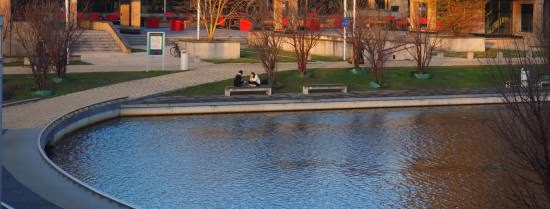Migration and integration: these are themes that have been the subject of heated debate in politics and during elections for many years. But solving the problems associated with these themes doesn’t seem possible. That’s exactly what interests Peter Scholten (40), professor of Public Administration at Erasmus University Rotterdam. “As a researcher I don’t have to find the solution, but I can investigate what’s behind the problems,” is Peter’s realistic view of his work, in that he enjoys looking beyond boundaries.
Peter talks a lot with policymakers. He has intense contact with the City of Rotterdam, and with the EU in Brussels. Although he’s in close touch, Peter is clear about his role as a researcher. “Too close an entanglement between policymaker and researcher is not always a good thing. I think I should be able to maintain my professional distance. Distance is a good method for conducting good scientific research. I can have an impact on these themes by holding up a mirror. Reflection on the anti-Islam attitude. Reflection on the Black Lives Matter debate. How do we really open up job applications so that everyone has a chance? And even closer to home: how can we create more diversity at Erasmus University Rotterdam? You can’t change our rather white teaching staff from one day to the next, and yet, what can we do nonetheless?”
Following the facts as closely as possible
After studying European Public Administration in Twente, Peter discovered that little attention is paid to the themes of migration and integration from a scientific point of view. It’s of special interest to him, also because he sees how today’s complex society is no longer so controllable and manageable. “I see that complexity and risks go hand in hand. That’s what makes modern public administration so much fun. Society turns out not to be engineerable. Today’s policy will be outdated tomorrow,” says Peter. “All you can do is follow the facts as best you can.”
Minority groups don’t exist
The administrative expert mentions ‘our’ view of minority groups in society as an example. Peter: “The point is: minority groups don’t exist. We have to learn to see society as all the different groups. The third generation of Moroccans in the Netherlands, for example, is completely different from the first generation. You can’t lump these different groups together, and we shouldn’t want that either.” Peter is averse to easy policies being used to score quick political points. Policies that can really work require a long haul. As a positive example, Peter praises the new approach to discrimination that Rotterdam is introducing: all sorts of mini-measures in several areas that will have to work over the longer term. “Rotterdam has resisted the temptation to just throw in a quick fix. There isn’t one anyhow. Rotterdam has recognised that. That’s courageous!”
IMISCOE
Peter finds recognition of these types of themes in collaborations with other researchers. IMISCOE is the definitive European research network on migration, integration and social cohesion. No fewer than 64 institutes and more than a thousand members have joined. And EUR leads this network. “I think that’s a great honour,” says Peter. “This is fundamental scientific research, for example into superdiversity. I think it’s great to see Rotterdam saying the same thing as London, for example: that in your diversity you have one identity.” In the Netherlands, EUR is also collaborating with the universities of Leiden and Delft in researching these themes. The Leiden-Delft-Erasmus (LDE) Centre for Governance of Migration and Diversity takes a multidisciplinary view of governance and policy issues in four cities in South Holland.
UNIC: inclusive university with impact
In addition to IMISCOE, EUR is also leading an initiative to create a European university: the European University of Post-Industrial Cities (UNIC). Peter’s connecting role is also evident here. “The great thing is that this is a collaboration between eight universities, all of which are very similar to EUR. They are universities in post-industrial cities, just as Rotterdam is. We have considered that consciously. We want to form a university that is anti-elitist. A university for ‘first-generation university students’: students whose parents have no university background.” In practice Peter notes that this is a different type of student: someone who depends less on the network, who doesn’t put himself into debt for an education, and who also needs a push to study internationally. It makes Peter’s challenge all the greater: “UNIC will be an inclusive university with impact. We are going to train non-traditional students, and those are the leaders of the future.”
- Professor

